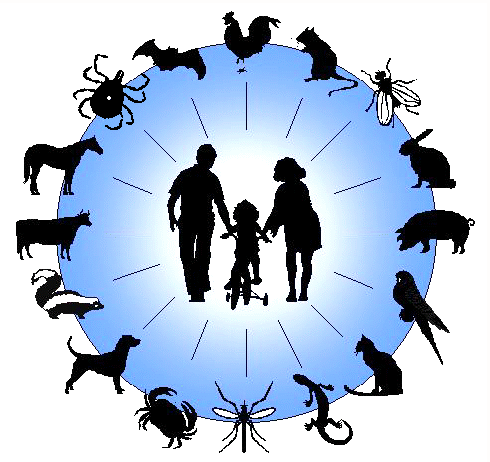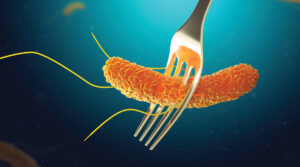Humans as species are constantly surrounded by animals, trees and nature. We need to respect these entities as they are the ones who maintain the ecosystem of earth and not humans, even if we would like to think the same. But sometimes humans interfere in the processes of nature and it backfires on humankind and always has produced fatal results. A crisis does not emerge out of thin air, but there are some underlying causes for it. Most of these causes are in front of us but we choose to ignore and act on them. Animals provide many benefits to humans as the interaction is symbiotic as animals provide food, fibre, livelihoods, travel, sport, companionship, etc. while receiving food shelter and protection from humans. However animals can sometimes carry harmful pathogens that can come in contact with humans and spread diseases which are termed as zoonotic diseases.
Anyone can get sick from a zoonotic disease, including healthy people. However, some people are at more risk and should take necessary steps to protect themselves and their family members. These people are more likely than others to get really sick, and even die, from these infections. Such people include children younger than 5 years of age, adults older than 65 age, people with weakened immune system and pregnant women are at risk too. One of the examples of such a zoonotic transfer of disease is the Covid-19. It has revealed how vulnerable we are to emerging diseases, and exposed the lack of wildlife health oversight, surveillance and management across the whole world. Our disturbance of the natural world and growing human and domestic animal populations are increasing contact with wild species and novel emerging infections.
Since the beginning of the 21st century, we have seen the emergence and outbreak of multiple zoonotic diseases/infections caused by bacteria and viruses alike, which jump from animals to humans. We have had three pandemics since 2000s- Severe acute respiratory syndrome (SARS) in 2003, H1N1 (swine flu) in 2009 and now Covid-19. SARS and Covid-19 spread from civet cats/ pangolin and bats originating from china and Swine flu from an intensive pig farming in Mexico. We have also had epidemics of bird flu from poultry, the Middle East Respiratory syndrome (MERS) from camels, Ebola from monkeys and pigs, Rift Valley fever from livestock, West nile fever from birds, Zika from monkeys and Nipah from bats. The root cause of these diseases can be traced back to environmental destruction, destructive cultural practices and intensive animal farms.
India has strong laws against deforestation and for curbing trade and consumption of wildlife. We have also put in place regulations to improve practices in animal farms. But many have not acted on these issues, and in a globalized world, we are only as strong as the weakest link. Weak regulations and poor implementation in one country can have global ramifications. The fact that next novel coronavirus or a new pandemic can emerge due to negligence in any country. The current social and economic practices around the world are just too poor to stop the next pandemic. To manage and prevent the next pandemic, the world needs to come together to address the underlying causes of zoonosis with the help of a Global Wildlife Health Authority. Such an agency would provide guidance and investment for wildlife health at the levels that the WHO and World Organization for Animal Health provide to countries in the domains of human and domestic animal health, respectively. This authority would need to work closely with established people in the health sector under one umbrella, and ensure sufficient coverage of wildlife and other environmental dimensions presently missing from initiatives under human or domestic animal health agencies.
It is beneficial to strengthen conservation outlines to include novel and known disease risks. Risk and impact assessment for economic development projects which aim to consider environmental and social factors, do not currently account for possible zoonotic disease risk. Adding this component could help governments and project designers to identify potential threats and better mitigate disease risk from the word go. India needs to tweak its public health policy on eradication of endemic and emerging zoonotic diseases by replacing the pathogen-centric approach with a all-inclusive human-animal-environment approach. We should aim for equal health for everyone which should include collaborative efforts, multidisciplinary work groups, and aim to attain optimal health for every being in the world. Given the scale of battling zoonotic diseases, India has a long way to go in terms of human and material resources to implement such mission. In order of this to work for controlling, eradicating and intervening, we have to work at different levels.
Coping with the unprecedented rise in the risk of pandemics and epidemics requires a holistic approach to medicine that treats human health as a part of whole of the environments health. Suppression of SARS was possible only through coordinated, multidisciplinary and multi-institutional efforts. Similarly, if we have to address zoonotic outbreaks and emerging infectious diseases like Covid-19, there should be a proactive approach to restore the wildlife health and well-being. It also requires close monitoring of how the increasing ecological footprint of humans is affecting health and disease dynamics.
So what can be done to protect ourselves from such zoonotic diseases?
- Keeping our hands clean by washing with soap and sanitized using sanitizers containing 60-70% alcohol.
- Avoid bites and scratches from animals.
- Prevent bites from mosquitoes, ticks, fleas, etc.
- Be aware of zoonotic diseases both at home and away (zoos or animal exhibits), and whenever we travel.
- Learning the ways to handle food products and edibles in a safer environment.
Zoonosis has killed millions of people and the economic cost has been in enormous range of billions of dollars. Countries cannot hide behind sovereignty and not act. The world, therefore, needs a universal code of conduct to address zoonosis urgently and correctly, nothing else will suffice.




